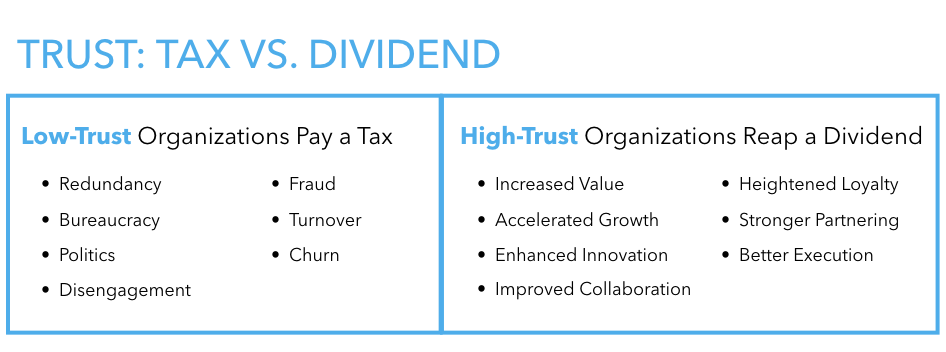Do your employees trust each other enough to get things done effectively? Do they trust you? I recently took a company through a session on “how to build trust with your team” based on the concepts from Stephen Covey’s book Speed of Trust so I’ll share some of the ideas here with you.
A lack of trust causes your team to hold back on doing what is expected and hampers communication. Your team will remain silent for fear of your response to their comments. They will not act on your request because they think you will change your mind soon. They refuse to trust others who have caused problems for them in the past and so our teams are not working together to get the best results.
Poor communications leads to lack of trust.
Communication is not what is said but what is understood. This video above is a great example of where the girl filming thinks she has given perfect instructions but the girl falling would not agree. A team that is built on trust can rule the world! Patrick Lencioni writes that a lack of trust is the foundation of dysfunctional teams. He points out that where there is a lack of trust people tend to:
- Conceal their weaknesses and mistakes from one another.
- Hesitate to ask for help or provide constructive feedback.
- Hesitate to offer help outside their own areas of responsibility.
- Jump to conclusions about intentions of others without attempting to clarify them.
- Fail to recognize and tap into one another’s skills and experiences.
- Hold grudges.
- Dread meetings and find reasons to avoid spending time together.
However, where there is High-Trust for each other people are willing to:
- Admit weaknesses and mistakes.
- Accept questions and input about their areas of responsibility.
- Give one another the benefit of the doubt before arriving at a negative conclusion.
- Appreciate and tap into one another’s skills and experiences.
- Focus time and energy on important issues, not politics.
- Offer and accept apologies without hesitation.
- Look forward to meetings and other opportunities to work as a group.
“Teams with high levels of trust add to the bottom line.”
Trust Affects The Bottom Line
In the Speed of Trust, Stephen Covey explains that trust can be rebuilt and is essential to create highly effective teams. There is a financial aspect of trust that can be a tax or provide a dividend. A lack of trust can tax your profits as people hold up progress due to bureaucracy and politics, by doing the same things twice because of a lack of communication, or not doing things at all.
If we have trust for each other we see a dividend of accelerated growth because people are working together to find new ideas and better ways to get things done. Our teams perform better and enjoy working together and we are making more profit. Look at this list below and see how this is affecting your team and your bottom line.

How much your team trusts each other will determine how successful your company will ever be in reaching your goals. Trust can be re-built and you can lead the effort by living in such a way that your team wants to trust you and each other. Click here to download the pdf of “13 Things That Build Trust.”
Make plans to attend our next CEO Learning Session on How to Build Trust and join other CEOs and business owners from DFW as we learn together. This is a great way to learn these concepts and see how other successful leaders are using trust to build their teams.
Better yet, bring me in to your company and I’ll teach your team how to build trust! If you want more information fill out the form below and we’ll contact you.
Robert Hunt